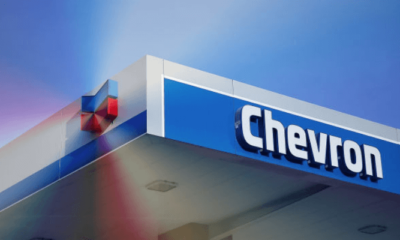Oil
Chevron announces first Oil From Jack/St. Malo project in the Gulf of Mexico

Chevron Corporation has announced that crude oil and natural gas production has begun at the Jack/St. Malo project in the Lower Tertiary trend, deepwater U.S. Gulf of Mexico. Jack/St. Malo is a key part of Chevron’s strong queue of upstream projects and was delivered on time and on budget.

The Jack/St Malo semi-submersible floating production unit is the largest of its kind in the Gulf of Mexico and has a production capacity of 170,000 barrels of oil and 42 million cubic feet of natural gas per day, with the potential for future expansion. (Photo: Business Wire)
The Jack and St. Malo fields are among the largest in the Gulf of Mexico. They were discovered in 2004 and 2003, respectively, and production from the first development stage is expected to ramp up over the next several years to a total daily rate of 94,000 barrels of crude oil and 21 million cubic feet of natural gas. With a planned production life of more than 30 years, current technologies are anticipated to recover in excess of 500 million oil-equivalent barrels. Successive development phases, which could employ enhanced recovery technologies, may enable substantially increased recovery at the fields.
“The Jack/St. Malo project delivers valuable new production and supports our plan to reach 3.1 million barrels per day by 2017,” said George Kirkland, vice chairman and executive vice president, Upstream, Chevron Corporation.
“This milestone demonstrates Chevron’s capital stewardship and technology capabilities, featuring a number of advances in technology that simply didn’t exist when the fields were discovered,” added Jay Johnson, senior vice president, Upstream, Chevron Corporation. “These learnings can now be transferred to other deepwater projects in our portfolio.”
The Jack and St. Malo fields are located within 25 miles (40 km) of each other in approximately 7,000 feet (2,100 m) of water in the Walker Ridge area, approximately 280 miles (450 km) south of New Orleans, Louisiana.
The fields were co-developed with subsea completions flowing back to a single host, semi-submersible floating production unit located between the fields. The facility is the largest of its kind in the Gulf of Mexico and has a production capacity of 170,000 barrels of oil and 42 million cubic feet of natural gas per day, with the potential for future expansion.
“Jack/St. Malo is the result of the collaboration of hundreds of suppliers and contractors and many thousands of people across nine countries over a ten-year period,” said Jeff Shellebarger, president, Chevron North America Exploration and Production Company. “This project highlights our long-term commitment to the U.S. Gulf of Mexico, where Chevron is among the top leaseholders. Moreover, we expect Jack/St. Malo will continue to deliver sustained economic and community benefits, including job creation, along the Gulf Coast.”
Crude oil from the facility will be transported approximately 140 miles to the Green Canyon 19 Platform via the Jack/St. Malo Oil Export Pipeline, and then onto refineries along the Gulf Coast. The pipeline is the first large-diameter, ultra-deepwater pipeline in the Walker Ridge area of the Lower Tertiary trend. The combination of extreme water depths, large diameter, high-pressure design, and pipeline structures have set new milestones for the Gulf of Mexico.
The project, which was sanctioned in 2010, has delivered new technology applications, including the industry’s largest seafloor boosting system and Chevron’s first application of deepwater ocean bottom node seismic technology in the Gulf of Mexico, providing images of subsurface layers nearly 30,000 feet below the ocean floor.
Chevron, through its subsidiary, Chevron U.S.A. Inc., has a working interest of 50 percent in the Jack field, with co-owners Statoil (25%) and Maersk Oil (25%). Chevron, through its subsidiaries, Chevron U.S.A. Inc. and Union Oil Company of California, also holds a 51 percent working interest in the St. Malo field, with co-owners Petrobras (25%), Statoil (21.5%), ExxonMobil (1.25%) and Eni (1.25%); and a 40.6 percent ownership interest in the host facility, with co-owners Statoil (27.9%), Petrobras (15%), Maersk Oil (5%), ExxonMobil (10.75%) and Eni (0.75%).
Chevron is one of the world’s leading integrated energy companies, with subsidiaries that conduct business worldwide. The company is involved in virtually every facet of the energy industry. Chevron explores for, produces and transports crude oil and natural gas; refines, markets and distributes transportation fuels and lubricants; manufactures and sells petrochemical products; generates power and produces geothermal energy; provides energy efficiency solutions; and develops the energy resources of the future, including biofuels.
Oil
NNPC Targets 60% Methane Emission Reduction By 2031
The Nigerian National Petroleum Company Limited (NNPC) has unveiled a bold strategy to reduce methane emissions in the oil and gas sector by 60% by 2031, with an ultimate goal of achieving net-zero emissions by 2060.
This announcement reinforces Nigeria’s leadership role under the Global Methane Pledge initiative and its commitment to tackling climate change.
The Group Chief Executive Officer of NNPC, Mele Kyari, disclosed these plans during a meeting on Thursday with Robert Leahman, the U.S. State Department’s Global Methane Program Manager, and a delegation from Deloitte.
READ MORE: Atiku Gloats Over AUN’s Achievements Ahead Of 20th Anniversary
The discussions, held at the NNPC Towers in Abuja, focused on collaborative efforts to reduce methane emissions through innovative and sustainable practices.
“Reducing methane emissions is not just an environmental necessity but also a strategic imperative for Nigeria’s energy transition. We are leveraging partnerships to adopt global best practices and innovative solutions,” Kyari stated.
Key among these efforts is a pilot project in the Niger Delta, aimed at establishing emissions baselines, mitigating methane leaks, and promoting sustainable operations across Nigeria’s energy sector.
The project, a partnership between NNPC, Deloitte, and the U.S. Bureau of Energy Resources, will utilize data-driven methodologies to pinpoint and address methane hotspots.
Robert Leahman commended Nigeria’s proactive stance, describing it as a benchmark for other nations on the continent.
“Nigeria’s leadership under the Global Methane Pledge sets a standard for the continent. These initiatives will not only help reduce emissions but also drive sustainable development in the energy sector,” he said.
Kyari highlighted the broader benefits of addressing methane emissions, noting its significance for both environmental protection and economic efficiency.
“This collaboration is a game-changer. By addressing methane leaks, we’re reducing waste, saving costs, and protecting the environment. It’s a win-win for our economy and the planet,” he added.
Oil
FG Introduces New Incentives To Revitalize Nigeria’s Oil & Gas Industry
In a strategic move to revitalize Nigeria’s oil and gas sector, the Federal Government has unveiled two key fiscal incentives aimed at attracting investment and enhancing energy security.
The announcement was made by Mr. Wale Edun, the Minister of Finance and Coordinating Minister of the Economy on Wednesday.
The first initiative, the Value Added Tax (VAT) Modification Order 2024, introduces critical exemptions for essential energy products and infrastructure, including Diesel, Feed Gas, Liquefied Petroleum Gas (LPG), Compressed Natural Gas (CNG), Electric Vehicles, Liquefied Natural Gas (LNG) infrastructure, and Clean Cooking Equipment.
Read Also: Atiku Calls For Rotational Presidency Across Nigeria’s Geopolitical Zones
These exemptions are designed to reduce living costs for Nigerians, promote energy security, and accelerate the transition to cleaner energy alternatives.
The second initiative, the Notice of Tax Incentives for Deep Offshore Oil & Gas Production, offers new tax relief options for deep offshore exploration projects.
This measure aims to position Nigeria’s deep offshore basin as a premier destination for international oil and gas investments, boosting the country’s appeal to foreign investors.
These reforms are part of a broader set of policy initiatives, known as Policy Directives 40-42, endorsed by President Bola Ahmed Tinubu.
The directives reflect the administration’s commitment to fostering sustainable development in the energy sector and enhancing Nigeria’s competitive edge in the global oil and gas market.
Business
Tinubu set to approve ExxonMobil-Seplat oil deal, expands CNG bus initiative

By Yemie Adeoye
NIGERIA’s President Bola Tinubu has announced that the protracted ExxonMobil-Seplat upstream oil divestment will be formally approved by the Minister of petroleum within a matter of days, just as he announced his government’s intention to expand the Compress natural Gas, CNG buses initiative.
The President who stated this during his Independence day nationwide broadcast stated that the move is in line with his administration’s commitment to free enterprise, free entry and free exit in investments which is the hallmark of his administration investment policy.
“Fellow compatriots, our administration is committed to free enterprise, free entry, and free exit in investments while maintaining the sanctity and efficacy of our regulatory processes. This principle guides the divestment transactions in our upstream petroleum sector, where we are committed to changing the fortune positively. As such, the ExxonMobil Seplat divestment will receive ministerial approval in a matter of days, having been concluded by the regulator, NUPRC, in line with the Petroleum Industry Act, PIA. This was done in the same manner as other qualified divestments approved in the sector.”
The President also seized the opportunity to plead with Nigerians to be patient with his administration’s reform policies. “As your President, I assure you that we are committed to finding sustainable solutions to alleviate the suffering of our citizens. Once again, I plead for your patience as the reforms we are implementing show positive signs, and we are beginning to see light at the end of the tunnel”.
“Our energy transition programme is on course. We are expanding the adoption of the Presidential Initiative on Compressed Natural Gas for mass transit with private sector players. The Federal Government is ready to assist the thirty-six States and FCT in acquiring CNG buses for cheaper public transportation.
Fellow Nigerians, while we are working to stabilise the economy and secure the country, we also seek to foster national unity and build social harmony and cohesion. Our economy can only thrive when there is peace”. he enthused.



















